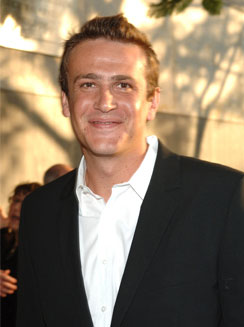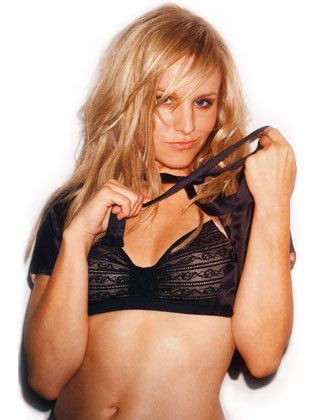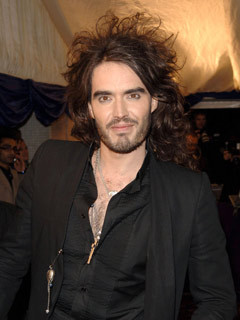 Jason Segel is late for lunch, but that’s his problem. I’m on a mission. I’ve got to find out where Judd Apatow’s Lakers seats are. And Segel – the writer and star of Forgetting Sarah Marshall, the set I’m ostensibly "visiting" – can either cough up the info, or eat a cold veggie burger.
Jason Segel is late for lunch, but that’s his problem. I’m on a mission. I’ve got to find out where Judd Apatow’s Lakers seats are. And Segel – the writer and star of Forgetting Sarah Marshall, the set I’m ostensibly "visiting" – can either cough up the info, or eat a cold veggie burger.
"They are as good a seats as you could possibly imagine."
Courtside?
"Better than courtside?"
Do you get free shoes at the end? Some face time with Kobe? A game of "Horse" with Magic? "Pig" if his time is short?
"Dude, I can’t even tell you what you get at the end."
Are the seats under the floor?
The color drains from Segel’s face. He fidgets with his pack of American Spirits. His eyes dart about the tiki bar serving as today’s "Hawaiian" location. Finally, they fix on the framed painting of a brawny fisherman hauling in a feisty marlin from the choppy seas. The significance is not lost on him. After a brief, anguished moment, Segel turns back and stares me down.
"You know, I can’t talk about Judd’s Laker seats."
And he is gone.
I’ve heard stories about Apatow’s Laker seats, but they’re the kinds of things you print only if you’ve got indisputable photographic proof or a hard-on for libel suits. I have neither So I must content myself with Segel’s frustratingly vague, "better than courtside" intimations of god-knows-what, and, instead, dutifully relate his innocuous anecdote about the origins of his feature screenwriting debut, Forgetting Sarah Marshall.
What was only a few minutes ago suddenly feels like last year. "I was at a Laker game with Judd," marveled Segel, his eyes smiling. "And Judd said, ‘I can get a movie made now, so if you have any ideas you should let me know.’" Segel didn’t waste any time. After polishing off a plate of beer-battered panda paws, he hatched Forgetting Sarah Marshall. "I pitched him the idea in the second quarter, and by the fourth quarter we were riffing back and forth. So he said, ‘Do me a favor: write up an outline and send it to me tomorrow.’ So I went home, worked all night, and sent him an outline on, I think, Friday. By Monday, contracts were out from Universal. That’s the power of Judd Apatow."
 To what extent those Lakers seats greased the studio machinery (LeBron James was in town that weekend), we’ll probably never know. But the premise of Forgetting Sarah Marshall is promising enough on its own to suggest Universal would’ve snatched the project up regardless. Segel stars as Peter Bretter, a meandering musical theater composer whose life is wrecked when his famous girlfriend, Sarah Marshall (Kristen Bell), dumps him for a flaky British rock-and-roller bearing the insanely pompous moniker "Aldous Snow" (Russell Brand). Distraught, Peter flees for Hawaii to lick his wounds – only to have them ripped open again when Sarah and Aldous check in to the same hotel.
To what extent those Lakers seats greased the studio machinery (LeBron James was in town that weekend), we’ll probably never know. But the premise of Forgetting Sarah Marshall is promising enough on its own to suggest Universal would’ve snatched the project up regardless. Segel stars as Peter Bretter, a meandering musical theater composer whose life is wrecked when his famous girlfriend, Sarah Marshall (Kristen Bell), dumps him for a flaky British rock-and-roller bearing the insanely pompous moniker "Aldous Snow" (Russell Brand). Distraught, Peter flees for Hawaii to lick his wounds – only to have them ripped open again when Sarah and Aldous check in to the same hotel.
Though I would’ve been more than happy to drop in on the set of Forgetting Sarah Marshall when they were braving the inhospitable climes of the North Shore, stopping by for half a day while they transform a Silverlake tiki bar into a Hawaiian tiki bar – which entails strewing about bottles of Kona and maybe doubling up on the leis – is a pleasure all the same. This is the second Apatow set I’ve visited (the first being Knocked Up), and I’m happy to find that the critical acclaim, commercial successes, and hagiographic behind-the-scenes profiles (such as this one) haven’t upset the loose, friendly vibe. For a production nearing wrap, everyone – from director Nicholas Stoller to producer Shauna Robertson to Segel, who’s worked every single day for nearly three months – seems surprisingly energetic and just flat-out happy to be making a movie.
The scene being shot today entails of bit of nascent romantic bonding between Peter and Rachael, a saucy islander played with all-due-and-then-some sassiness by Mila Kunis. Over beers, Peter recalls the lowlights of dating Sarah (e.g. being photographed picking up her dog’s droppings with his bare hand while she poses for the paparazzi). After some amusing, largely improvised banter (I’m still trying to figure out how Segel worked a Farnsworth Bentley reference into the scene), Rachael finally gets Peter to talk about his own artistic aspirations, which are harnessed to a puppet musical rendition of Bram Stoker’s Dracula. After a few minutes of this, Peter excuses himself to use the facilities; when he returns, he discovers much to his horror that Rachael has convinced the bar band to let him sit in and perform a number from the musical (an overwrought lament by Dracula featuring lyrics like, "It’s getting too hard to believe things are going to get easier").
The first part of the day is devoted to capturing Segel’s and Kunis’s repartee. The bar is incredibly narrow, so Stoller’s options are limited to basic, stationary shots; if there was any dollying, it was done after I left. Generally, Stoller hangs back in video village and shouts out suggestions and adjustments to Segel and Kunis while the camera rolls – which is precisely what Apatow did for Seth Rogen and Paul Rudd the day I visited the Knocked Up set (for the blink-and-you’ll-miss-it record store scene). Some might call this slop art, but there’s nothing clean about improvisation; and it’s always preferable to catch the moment of invention as it happens rather than restage it.
This is Stoller’s first outing as a director, but he has a history with Segel dating back to Undeclared, where the pair collaborated on the jilted (and painfully unhinged) boyfriend character of Eric. "That’s where our joined love for tragedy in dating was born," remarks Segel. So is Peter essentially a big screen iteration of Eric? "[Peter’s] got a different center, but it’s the same subject matter of desperation and feeling like you’re drowning."
If Stoller’s feeling any pressure to drive one to the bleachers his first time at bat (though Superbad hadn’t opened yet when I visited this set, it was already being screened to rave reviews from critics and recruited audiences alike), he’s not showing it. During a break in the shooting, he gathers the journalists in video village to show us footage of the fake CSI-like show starring Sarah Marshall and a very real Billy Baldwin. It’s called Crime Scene: Scene of the Crime, and they apparently toyed with the idea of shooting a full episode for the hell of it before settling for a series of scenes depicting Baldwin slipping on sunglasses whilst delivering monotone (and often nonsensical) one-liners ala David Caruso (my favorite: "You can run and you can hide, but you can’t do both at the same time.") It’s inspired stuff.
 Stoller is also sure to give us a taste of Russell Brand, who appears to be this film’s breakout performer – i.e. as far as American audiences are concerned. Already well known in his native England as a presenter and all-around out-there personality, Brand was cast late in the game after Stoller and Segel had trouble finding an actor to portray what was originally intended to be an effete British novelist. But Brand’s whacked-out presence proved too much to resist; as soon as he walked into the audition, Stoller and Segel knew they had their guy, and immediately rewrote the character as a rock star.
Stoller is also sure to give us a taste of Russell Brand, who appears to be this film’s breakout performer – i.e. as far as American audiences are concerned. Already well known in his native England as a presenter and all-around out-there personality, Brand was cast late in the game after Stoller and Segel had trouble finding an actor to portray what was originally intended to be an effete British novelist. But Brand’s whacked-out presence proved too much to resist; as soon as he walked into the audition, Stoller and Segel knew they had their guy, and immediately rewrote the character as a rock star.
Watching Brand perform Aldous Snow’s hit single "Inside of You" at the urging of an overzealous fan (played by Jonah Hill), it’s immediately obvious that they made the right decision. He’s like Morrissey with a rampaging libido (when simply "Morrissey with a libido" would more than suffice). According to Segel, "He’s got this swagger, and it’s a swagger combined with a sort of disconnection to reality." Adds Kunis, "[Russel’s] a whole other species of a person."
This is Kunis’s first film with the Apatow crew, and while she seems to be enjoying herself, the improv aspect has been a challenge. "Judd and Jason… all they want are tantrums and rants," says Kunis. "And Kristen [Bell] and I just sit there and are like… (blank faced). It’s not where we come from. Neither of us is that great at improv. I mean, we’re good at staying on our toes and being there, but we’re not like [improvisational]. That takes some skill. You just sit back and go with it, and you try to put your five cents in when you can. But we laugh at every single take, and they’re like ‘You’ve gotta stop!’"
To her credit, Kunis doesn’t blow single take, though it probably helps that she doesn’t have to be on camera much for Segel’s Dracula number – which would play like a parody of Jim Steinman had Steinman not already perpetrated the equally ludicrous Dance of the Vampires. Segel wrote the song himself and performs it with straight-faced gusto despite its silly, self-consciously awful lyrics. There’s a sense that he can’t believe he’s getting paid to do this; after all, he’s enlisted a "Who’s Who" of comedic talent and an entire film crew to bring his screenplay to life.
But Segel remains entirely humble about the whole endeavor. "People ask if it’s a dream come true to hear your words read by an actor," he says. "It’s been a dream come true to hear your words improved by the other actors."
If I were in his position, I wouldn’t say shit about Apatow’s Lakers seats either. But that doesn’t mean I’m gonna stop digging.